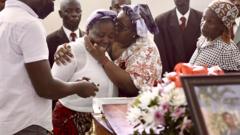In Mozambique, mourners gathered in a cemetery, grieving the loss of lives cut short by a politically charged atmosphere. A poignant scene unfolded as children paid heartfelt tributes to 16-year-old Antonio Juaqim, who was shot while joining a pot-banging protest against the recent presidential election results.
Antonio's uncle, Manuel Samuel, revealed the grim details of his death, confirming that security footage showed police firing at demonstrators. The police responded to protests after the ruling party, Frelimo, claimed victory in the elections, receiving 71% of the votes. The main opposition candidate, Venâncio Mondlane, alleges the election was rigged and has called for nationwide protests.
The demonstrations began on November 15, uniting Mozambicans in a nightly display of defiance by banging pots and pans—a call for change echoing through the streets of Maputo. Tragically, Antonio was among those who lost their lives in the unrest, leading to a shift in how protests are conducted, with many now protesting safely at home.
During Antonio's eulogy, friends spoke of dreams and aspirations lost too soon, as they laid flowers and released balloons in his memory. Reports indicate that at least 40 people, including children, have lost their lives during these violent encounters. Samuel lamented, "They are killing us and our future."
Although authorities expressed sympathy for victims' families, they defended police actions, blaming protestors for violence. Critics, however, argue that excessive force is being unjustly applied against dissenters. Analysts convey concerns over rising discontent, especially among the youth, who yearn for economic independence and opportunities.
As Mondlane's supporters mourn their dead, they continue to call for justice and an end to Frelimo's longstanding rule, eager for a shift that embraces a new Mozambique where young voices matter.




















